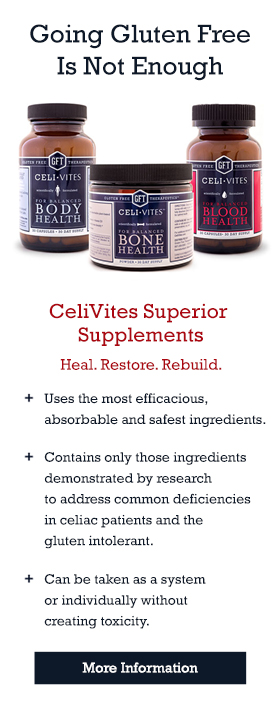
Newly Diagnosed with Celiac Disease means Vitamin and Mineral Deficiencies
Celiac Disease & Nutritional Deficiencies
The July 2013 journal Nutrients contains the results of an important study out of the Netherlands regarding the link between vitamin and mineral deficiencies among recently diagnosed and untreated celiac disease patients. The study, in concurrence with similar findings in other studies, concludes that malnourishment or lack of specific nutrients is problematic enough to call upon physicians to address the issue with their celiac disease patients with a greater sense of urgency.
The study explored the commonality of vitamin and mineral deficiencies among patients that were newly diagnosed with celiac disease, based upon evaluation of 80 newly diagnosed celiac disease patients. The VU University Medical Centre Department of Nutrition and Dietetics along with its Department of Gastroenterology in Amsterdam determined that the majority of adults in an untreated “early diagnosis” celiac disease patient group suffered from at least one, if not many, vitamin and mineral deficiencies.
Previous studies conducted throughout Europe have documented varying degrees (12 percent to 41 percent) of Vitamin B12 deficiencies among untreated celiac disease patients. Small studies have also indicated deficiencies of fat-soluble vitamins A, E, and D among untreated celiac disease patients.
Vitamin and Mineral Deficiencies Findings
The VU Medical Centre study tested folic acid, zinc, iron, and vitamins A, B6, B12, and D. Among the group of celiac disease patients tested, 87 percent suffered at least one nutritional deficiency with many of them suffering from multiple deficiencies. Statistically significant deficiencies are found in the below table:
Vitamin/Minerals Deficiency Percentage
Iron 46 percent had deficiencies
Folic Acid 20 percent had deficiencies
Vitamin B12 19 percent had deficiencies
Vitamin B6 14 percent had deficiencies
Vitamin A 7.5 percent had deficiencies
Vitamin D 4.8 percent had deficiencies
Zinc 66.7 percent had deficiencies
Among all patients participating in the study group, 17 percent were malnourished. Ten percent of participants experienced involuntary weight loss. While 46 percent of untreated celiac disease patients experienced iron deficiencies, 25 percent actually suffered from iron-deficiency anemia. Among the women who participated in the study, 22 percent were underweight. A surprising discovery of the study shows that 29 percent of the patients were overweight, meaning they had a BMI that is greater than 25.
The Takeaway
The result of the study is the conclusion that including intensive nutritional assessments regarding body weight and other nutritional parameters is critical to successfully treating celiac disease. Newly diagnosed patients should speak to their doctor about getting their vitamins and mineral levels tested, and if determined to be low, discuss improving these nutritional deficiencies with dietary changes and/or dietary supplements for celiac disease. Physicians must monitor body weight for fluctuations, especially weight loss, between initial and follow-up visits. They should also look for physical signs of vitamin and mineral deficiencies and malabsorption, such as chronic diarrhea, skin lesions, and deviations in bone density. Follow-up treatment needs to address the nutritional needs of patients beyond the gluten-free aspects of their diets. In fact, successfully treating celiac disease requires addressing the nutritional vulnerabilities of celiac disease patients — including the need for certain nutritional supplements and vitamins.
This original article is made possible by Gluten Free Therapeutics. Our mission is to educate, inform, and provide the most effective nutritional products possible to allow those with celiac disease and serious gluten intolerances to heal their bodies. CeliVites complete line of superior gluten free supplements includes multivitamin/multimineral supplements, iron supplements, and calcium supplements for people living with celiac disease. All CeliVites products are designed to help you heal, restore and rebuild your body, because going gluten free isn’t enough!
Comments ()















